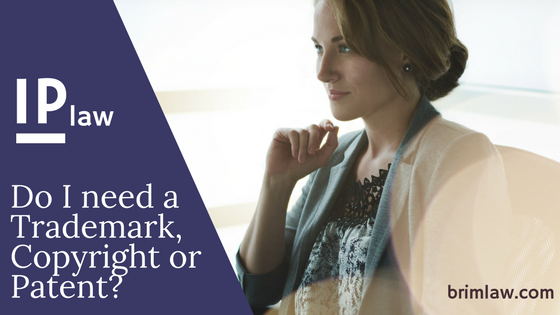DO I NEED A TRADEMARK, COPYRIGHT, OR PATENT?

DO I NEED A TRADEMARK, COPYRIGHT, OR PATENT?
You just wrote the last chapter of the “Great American Novel.” Maybe you composed a musical composition that will certainly entertain and delight the masses. OR perhaps after years of toiling in your garage, your top-secret invention is complete and ready for production.
What should you do next?
It’s probably time to start thinking about protecting your work product. Naturally, you do not want someone to come along and capitalize on your ingenuity, especially if you created something that may be worth a substantial amount of money.
Having an idea is central to the principles supporting Intellectual Property (“IP”) law. However, an idea, in and of itself, is not sufficient to receive protection under IP law. Often, business owners are surprised to learn that it’s perfectly legal for someone to steal their ideas (with only a few exceptions). However, ideas that are secured under IP law are protected if you discover that another business has stolen your ideas. To receive exclusive rights to your work product, your idea must be embodied in some tangible form.
Let’s say you have an idea about a love story taking place during the American Gold Rush that you have not written yet. Unfortunately, you cannot use IP law to protect that story. The story only exists in your head; there is no identifiable embodiment of your Gold Rush-era love story. Conceptually, your romantic novel may have best-seller written all over it, but this idea needs to be manifested on paper, in type, or in a recording before it can be protected.
Intellectual Property Classifications
Under IP law, work products are not treated the same and belong to one of four classifications (although, there may be some overlap between classifications). In this article, we are covering three of the main classifications that typically come to mind when considering IP protection. Click HERE —> Trade Secrets – to learn how to protect your work product as a Trade Secret when other IP classifications do not work.
Trademark
According to the United States Patent and Trademark Office, a trademark protects “words, names, symbols, sounds or colors that distinguish goods and services from those manufactured or sold by others and to indicate the source of the goods.”
A trademark includes items like a slogan, recording, business name, or logo. Trademarks are unique business identifiers, and the first step to registering a trademark should involve a comprehensive search to determine if the identifier you want to use for your business is already in use.
Copyright
The United States Copyright Office protects “literary, dramatic, musical, artistic, and certain other intellectual works.” For example, you can copyright creative works such as books, music, and movies.
Works are copyrighted at the time of completion (when the idea is in a fixed, tangible form), which is known as “common law” protection. However, to actually have the right to sue someone for unlawfully using your work product (known as copyright infringement), you must formally seek registration of your intellectual work with the US Copyright Office before filing suit.
Patent
A patent is a bundle of rights associated with an invention that flow to the inventor or their assignee. The rights last for a limited period of time (normally 20 years) and prevent others from making, using, selling, offering for sale, or importing the patented invention for the term of the patent. We’re talking about inventions like machinery, designs, and processes.
The requirements to obtain a patent are particularly complex and consist of the following key components:
• The work must be novel;
• It must be “non-obvious”; and
• Your work must be useful.
I know what you’re thinking – “aren’t those requirements within the eye of the beholder.” These key requirements may seem subjective, but ideas rarely receive patent protection unless they are original, unique ideas. Similar to copyrighted materials, patents must be registered to sue someone for stealing your innovative idea and/or to seek compensation for profits they gained from using your idea.
Intellectual Property is a highly technical area of law that involves numerous steps and legal standards. Honestly, part of being an entrepreneur is about taking risk, but you don’t want to risk someone else enjoying the fruits of your labor.
Seek out experienced and competent legal counsel to provide you appropriate guidance. You can count on Brim Law to provide you with top-quality service for all of your IP law needs.
Your Thoughts: Do you have an invention idea? Have you ever tried trademarking your logo or copyrighting your book on your own? What do you wish someone would have told you before you started the process on your own?
This article is intended to provide you with general information; it does not constitute any type of legal advice. For recommendations related to your specific matter, we encourage you to review our Practice Areas page for additional information and then contact us to discuss your company’s legal needs.

